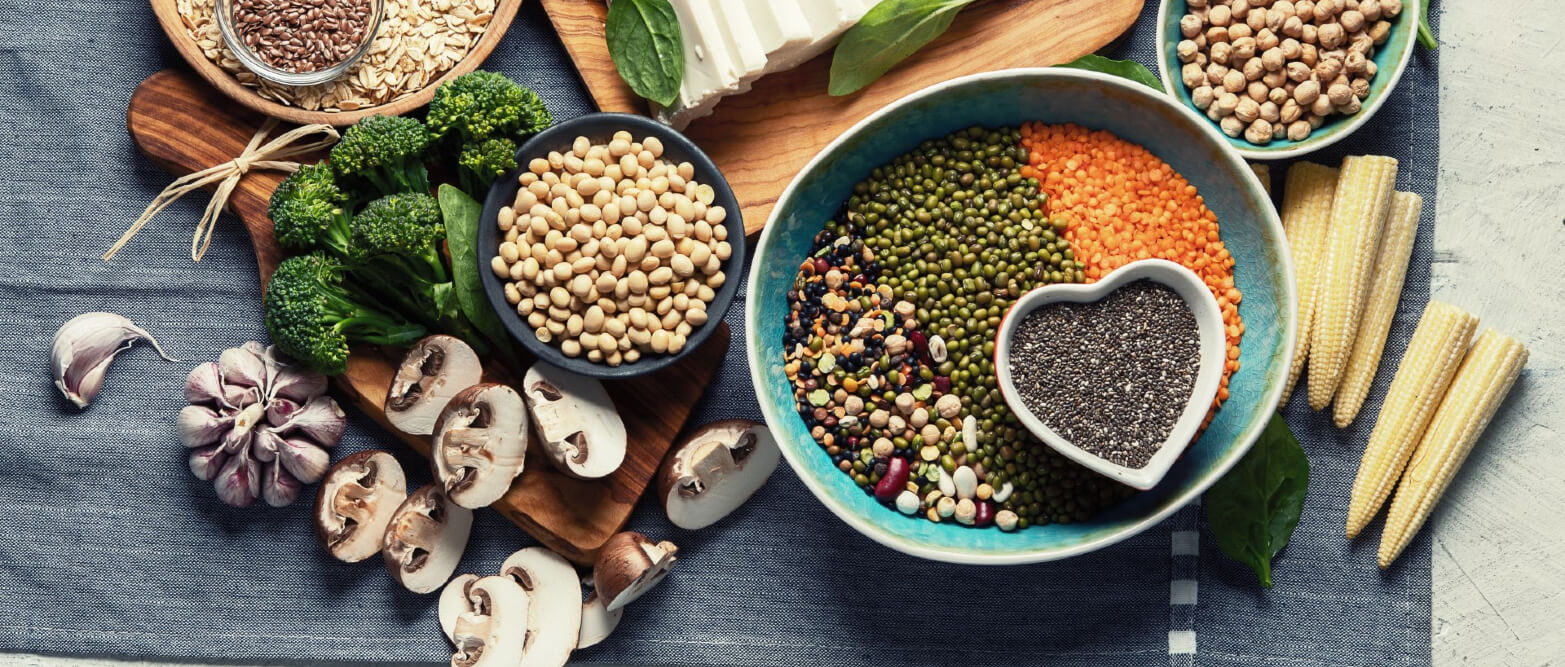As we strive for sustainability and health, alternative proteins emerge as a crucial dietary component. This blog post dives into ten pivotal trends in alternative protein production for 2024, underscoring the shift towards innovative, environmentally friendly, and ethical food sources.
Proteins are fundamental to our health, providing the nine essential amino acids necessary for optimal body growth, repair, and energy needs. Ensuring an adequate intake of high-quality proteins is crucial for maintaining good health and optimal bodily functions.
While we have traditionally relied on sources of protein like meat, fish, dairy, nuts, grains, and eggs, reflecting diverse cultural preferences and food availability, the search for alternative sources is gaining momentum.
Alternative protein sources—ranging from plant-based options like legumes and quinoa to innovative lab-grown meats and even insect protein—offer promising avenues to meet our nutritional needs in an environmentally friendly manner. These alternatives not only align with a variety of dietary preferences but also hold the key to addressing some of the global challenges of food sustainability and security.
In the US, close to 70% of protein intake comes from animal sources. Meanwhile, across other regions, over 2 billion people – or a quarter of the world’s population – rely on insects for their protein needs. This showcases our remarkable adaptability in securing essential nutrients. Our inherent adaptability is enabling a new trend towards alternative protein production.
Several factors are driving global macro trends towards the production of alternative proteins. These include population growth pressures, the environmental footprint of animal farming, the impacts of climate change, and a growing emphasis on ethical consumption. We will explore these trends in detail.
Emerging AgTech and Food Tech innovations are making alternative-protein production increasingly viable. With a growing market for plant-based proteins, numerous startups are emerging to meet the public’s growing interest in diverse protein sources. Major food producers are also highly receptive to innovative plant-based protein solutions and are ready to invest in new products and food technologies.
ICL Group is a global leader in phosphate-based food solutions, next-generation fertilizers, and data-driven AgTech solutions. It is also a major innovator that invests in strategic partnerships with a variety of startups that are providing advanced technical solutions to capitalize on alternative protein trends.
Behind ICL’s innovations lies a deep commitment to creating sustainable solutions for humanity’s greatest challenges. Among these, developing sustainable innovations and helping advance food security to achieve the United Nations’ Sustainable Development Goal of Zero Hunger, stand out significantly. Alternative proteins, sourced from a wide variety of sources, have a key role to play in nourishing the growing human population and aiding in the elimination of hunger.
Let’s delve into the top ten alternative protein trends that are not only redefining our plates but also paving the way for a sustainable future in 2024.
Top Alternative Protein Trends in 2024:
- Embracing Sustainability and Ethical Consumption
- Highlighting Innovative Protein Sources on the Rise
- Prioritizing Health, Wellness, and Nutritional Value
- Advancing Technological Innovations in Food Production
- Enhancing Transparency and Traceability
- Making Alternative Proteins More Affordable
- Rising Interest in Flexitarian Diets
- Innovating Packaging and Reducing Waste
- Leveraging Generative AI for Alternative Protein Development
- Fostering Collaboration Across Industries
1. Embracing Sustainability and Ethical Consumption
The human population has already topped 8 billion. The United Nations expects it to reach 9.8 billion by 2050 and 11.2 billion by 2100. Traditional agricultural (and food processing and distribution) methods cannot deliver food security for all these people without causing unsustainable environmental damage. Supply chains are precarious and are vulnerable to extreme weather events such as drought and flooding, as well as geopolitical events like wars that can reduce the availability of vital fertilizers, deny access to agricultural land, or close shipping lanes.
We’re already seeing an urgent shift to sustainable farming, enabled by rapid advances in AgTech solutions and products. These include a growing interest in the localized manufacture of alternative proteins. Industrialized production processes, scaleable from major plants, all the way down to cottage industries, and running on hybrid clean energy grids, have the potential to produce affordable, high-quality protein products close to the consumer base. These can include fermentation plants, algae or seaweed tanks, lab-cultured meat, and pretty much any food production enterprise that doesn’t require acres of farmland.
2. Highlighting Innovative Protein Sources on the Rise
Baby boomers who were raised in prosperous North American and Western European societies grew up drinking milk and eating meat, cheese, and eggs. The post-war agricultural revolution delivered an unprecedented abundance of animal-derived proteins. Traditional staples like peas and oats went out of fashion to a large extent while nuts like almonds and soy products were seen as exotic and alternative “health foods”.
21st-century innovations like lab-grown (cell-based) meats, proteins derived from air, fungi, seaweeds, and other plant varieties would have seemed like something out of a science fiction movie to the average 1950s consumer. Modern shoppers are accustomed to seeing international food products on supermarket shelves and are far more receptive to new technologies. Nonetheless, consumer perceptions and acceptance of these novel trends in alternative proteins are still critical for market success.
3. Prioritizing Health, Wellness, and Nutritional Value
Food producers are profiting from public demand for foods that support overall wellness, including mental and physical health. These requirements have gradually shifted from folklore and superstition-based beliefs about what constitutes a healthy diet and nourishing food, towards science-based consumer preferences. In the later 20th century we saw global dietary trends towards low-fat foods, high-fiber diets, and low-carb diets, and there is now a greater understanding of the importance of protein and its role in achieving physical health.
What’s undeniable is that given a choice, most people will opt for healthy food choices most of the time. Awareness of the value of alternative proteins as a major component of a healthy diet is increasing. Food producers have been fortifying food products like bread and cereals with vitamins and minerals for decades. They are now adding essential nutrients to alternative proteins to boost their nutritional value and meet consumer needs.
4. Advancing Technological Innovations in Food Production
Technology has been key to food production since our ancestors explored techniques like salting and smoking, selective breeding, crop rotation, and fertilization. Modern advances include genetic engineering, fermentation, and cellular agriculture.
Next-Generation Plant-Based Proteins: Whole-Muscle Solutions
People who eat meat usually do so because they enjoy the gastronomical experience. Taste, texture, and odor are an important part of the experience and are not something that the average consumer is willing to compromise on. Manufacturers of plant-based alternatives to whole-muscle meats, such as chicken breasts and steaks have struggled to replicate the culinary experience. The public perception that plant-based alternatives to whole-muscle meats are inferior is creating a major opportunity for innovators who can deliver viable solutions.
Hybrid Meats
One of the most interesting alternative protein trends is consumer interest in hybrid meats. These typically combine lab-created meat material with plant-based proteins. Hybrid meats contain less meat, fat, and cholesterol than conventional products and are attractive to health-conscious and environmentally aware people who opt for a flexitarian diet.
Flexitarians want to reduce their overall meat consumption, rather than eliminating it from their diets entirely. Food producers who want to win customer loyalty need to address the same issues regarding taste, texture, and odor as suppliers of purely plant-based meat alternatives.
Precision Fermentation
Precision fermentation is simply an ancient technology taken to a new level. It utilizes microorganisms (under highly controlled conditions) to produce specific proteins that exactly replicate those found in animal products. Precision fermentation is successfully creating high-quality, sustainable protein alternatives such as dairy and egg white substitutes. It’s possible that industrialized protein fermentation plants could become as common in our cities as breweries. The potential positive impact on sustainability, nutrition, and food security is considerable, particularly when plants run on clean energy and recycle waste products.
5. Enhancing Transparency and Traceability
The kind of consumer demographic that actively shops for food products containing alternative proteins is also far more likely to demand transparency and traceability. The desire to check the origin of foods is partly down to health concerns and partly due to ethical considerations. Blockchain and similar technologies are enabling transparency and traceability as a basic packaging (and marketing) feature.
Producers are waking up to the need to increase transparency throughout the supply chain, from the origin of seeds to the final product. Other considerations include the overall green rating of a product (carbon footprint), whether employees receive a living wage, whether the product is locally produced, and even how the parent company performs on ESG scales.
6. Making Alternative Proteins More Affordable
The food market is an intensely competitive business. During strong economies, shoppers will fill their baskets and may be more likely to make consumer choices based on ethical considerations and health preferences. The cost of cell-cultured meat and other alternative protein products is currently high, restricting its mass appeal. Producers need to invest boldly in new technologies and appeal to a wider market.
A major goal for innovators is to make alternative proteins more affordable, and therefore accessible to a broader range of consumers. There are challenges – and potential rewards – across the entire spectrum of production technologies, raw material sourcing, and distribution. Solutions that lower costs and speed up regulatory developments could allow these products to reach the market more quickly. The potential demand exists, but scalability remains an issue.

7. Rising Interest in Flexitarian Diets
We already touched upon the phenomenon of flexitarian diets within the context of hybrid meat development. Any company planning to profit from alternative protein food trends should be aware of the rise of flexitarian diets. Even vegans and vegetarians sometimes want the flexibility to consume animal-based proteins, and hybrid meat that combines lab-created (zero cruelty) meat with plant-based proteins is a compromise that many will welcome.
People who see themselves as essentially omnivorous may still be concerned about animal welfare, and the environmental consequences and ethical implications of growing food staples as animal feed. If the quality and price of hybrid meats match farmed meat, flexitarians will quite possibly opt for it consistently. The essence of a flexitarian diet is flexibility and the freedom to choose and follow personal preferences (which can change frequently). Food producers need to tap into this growing market.
8. Innovating Packaging and Reducing Waste
People who make ethical and environmentally conscious choices about diet and food shopping also tend to expect sustainable packaging solutions. This is a major opportunity for food producers and retailers to influence consumer choice and develop brand loyalty with environmentally friendly packaging and recycling initiatives. There is a wealth of new packaging technologies to adopt, as well as possibilities to devise new ones as part of a circular economy.
Waste reduction during production and retail is also key to winning hearts and minds and developing brand loyalty. Advanced phosphates offer interesting possibilities when it comes to extending the shelf life of alternative protein products. Companies that can create useful – or edible – byproducts from the production process will have some great marketing and publicity opportunities.
9. Leveraging Generative AI for Alternative Protein Development
Generative AI is transforming the alternative protein industry, enhancing everything from product development to market readiness. By analyzing extensive data, AI surpasses traditional methods, refining proteins’ taste, texture, and nutrition. This technology not only accelerates research but also introduces precision in production and customization, addressing specific consumer needs efficiently.
Smart production techniques, integrated with the Internet of Things (IoT), are pioneering more precise and waste-reducing processes. Predictive analytics allow for anticipation of consumer trends, optimizing inventory, and reducing surplus. Yet, the embrace of AI needs careful attention to data privacy and transparency to maintain consumer trust.
ICL Planet Startup Hub has partnered with Agrematch, leveraging their innovative AI-driven platform for discovering bioactive compounds, to accelerate the development of sustainable products, thereby reducing R&D time and costs while enhancing market delivery of new solutions.
The promise of AI in alternative proteins is vast, offering a pathway to more sustainable and consumer-aligned products. As we refine AI’s application, its potential to revolutionize food innovation continues to grow, aligning with global sustainability and health goals.
10. Fostering Collaboration Across Industries
Alternative protein production is heavily dependent on new technologies, including many experimental ones. Strategic partnerships between tech companies, food producers, and environmental organizations are essential to drive innovation in the alternative protein space. Accelerators and innovation platforms like ICL Open, ICL Planet StartUp Hub, and TAMI are leading the way in connecting innovators with enablers.
ICL Planet in particular has developed several successful collaborations and partnerships with alternative protein production startups. The ICL Planet StartUp Hub portfolio includes Arkeon, an Austrian ingredients company that uses proprietary technology to convert CO2 directly into protein ingredients. Another startup, Plantible Foods produces a functional protein from lemna (a type of free-floating aquatic plant). The goal is to feed the world with nutrient-dense plant-based proteins. The startup Protera is an AI-driven startup that uses a predictive algorithm MADI™ in its development of new protein-based ingredients.
You may be interested in:
Alternative Proteins: Satisfying the Increasing Protein Demand Sustainably
Food Tech – The Next Frontier
Shaping Food Trends of 2024 – Sustainability, Diversity and Wellness
Looking Ahead: The Road for Alternative Proteins
The alternative protein sector is growing fast, fueled by people wanting healthier, more affordable food that’s good for the planet too. As the world’s population heads towards 10 billion, finding ways to feed everyone without exploitation of animals or damage to the environment is becoming more important. Alternative proteins could be a big part of the solution.
The alternative protein market is still young, but it’s getting a boost from new tech and innovation. Dynamic innovation, effective marketing to improve consumer education and awareness, industry collaboration, and regulatory support are all essential to speed up the process of integrating these high-tech foods into mainstream diets. As more people start asking for these products, there’s a strategic opportunity to shape a future food system that is secure, sustainable, and aligned with global health and wellness goals.
ICL is actively leveraging its access to specialty minerals, technological expertise, and the amazing passion and enthusiasm of over 12,500 talented employees to deliver groundbreaking solutions that will help feed our growing population, protect the environment, and create a truly ethical food production and supply chain.
We’re on the brink of a food revolution, and your ideas can help shape it. Contact us today to contribute to the future of food








